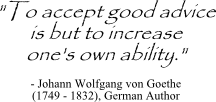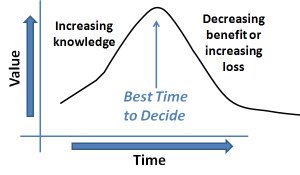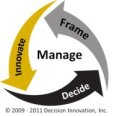Improve outcomes using these decision making tips
 Here are some decision making tips and ideas that can help you reach goals and fulfill your personal or business vision.
Here are some decision making tips and ideas that can help you reach goals and fulfill your personal or business vision.
Remember that decisions do not sit in isolation. A connected decision framework can help reveal the decisions that should guide your current choice, as well as the decisions that might be impacted. Avoid being surprised by misaligned choices and unintended consequences by considering the Connected Decisions™ before you decide.
Use these tips to avoid common decision errors, and as a guide to building your decision making skills. These tips for decision making are categorized for quick reference. Click on the following links to go directly to specific tips.

- Prioritization⇒
- Decision timing⇒
- Process⇒
- Emotions⇒
- Motivation and inspiration⇒
- Changing a decision⇒
- Building skills⇒
- Values⇒
- Seeking information and avoiding overload⇒
Decision making tips - Prioritization
Good decision making takes time and effort. Make time for important decisions by:
- Not spending effort on decisions that aren't needed
- Establishing the value of a decision and prioritizing those with the highest value (and importance)
- Quickly deciding low value (less meaningful) choices that don't justify additional time or effort
- Delegating lower value decisions that can be made by others
- Moving faster on reversible choices and more carefully on decisions that will have immediate consequences that aren't easily changed
Decision making tips - Decision timing

The best decision timing is achieved when the value of a decision is maximized by balancing the time needed to gain knowledge that informs the choice against the benefit loss that may result due to delay of decision implementation. The following decision making tips can help in improving that balance.
- Characterize the success factors or goals for the decision as the minimum information that must be gathered. Benefits won't be gained from the decision if factors that create value haven't been defined.
- Significant emotions can be involved that will motivate choosing too early or too late. If managing emotional responses becomes difficult, use an emotionally detached third party to help determine when best to decide.
- Give preference toward choosing sooner if information gathering and analysis efforts appear to be delaying clear benefits. Future outcomes always carry uncertainty, and making a decision may sometimes be the least expensive way to gain the knowledge of what will happen.
- Anticipate and be proactive for high value decisions. Strategic decision making can enable needed information and analysis efforts by considering choices well ahead of potential consequences.
- Don't let little choices accumulate. Apply time management techniques to your decision making to prevent a challenging backlog.
Decision making tips - Process

Have a decision making process. A well developed process enables continued improvement with each additional decision. A process can help reduce many of the biases and thinking errors that commonly occur when choosing. When you have a process that works, you can move into decision making without the delay of having to determine the steps, first.
Consider these guidelines for your decision making process:
- Record your decision efforts. It is hard to learn and improve from something that is not written down. Having things written also makes it possible to keep relevant information visible.
- Define success factors or criteria in advance of considering options. This ensures your needs and desires are understood prior to being influenced by benefits from specific solution alternatives.
- Try to get a balanced set of success factors. Outcomes often fail because a critical need or desire was not considered.
- Determine alternatives before gathering data.
- The process should consider the consequences and possible outcomes of alternatives, including how the decision will be implemented.
- Give preference to objective data, but subjective data is better than no data.
- Evaluate all alternatives for the same criteria versus all criteria for the same alternative. This helps avoid bias for a specific option.
- Start evaluation with the most important success factors first in case the effort gets cut short.
- Communicate throughout the process. Many good decisions fail when those needing to support them are not included during the decision making process.
- Recognize the difference between the process and repeatedly making the same decision. A new situation and circumstances make it a new decision.
Decision making tips - Emotions
- Feeling a lot of emotion regarding a decision? Sleep on it or add a little delay before choosing. Do not ignore your emotions, but do not let them keep you from thinking through an important decision objectively.
- Decision regret is wasted emotion. You can't change the past. Look forward. Use new information to make a new decision.
- We are continuously pressured to focus on insignificant, inappropriately urgent, or low value decisions. Feeling intimidated? Use the decision making tips for prioritization above.
- Overwhelmed? Keep breaking it down. Smaller decisions are easier to make. Our connected decision making model can help.
Decision making tips - Motivation and Inspiration

- Not deciding is a decision not to act. Take responsibility and decide, even if it is to choose to not act now.
- Coaches motivate. They are available to help with decision making as well.
- Need inspiration? Here are some decision quotes that can help.
Decision making tips - Changing a decision
- Good decision making does not guarantee outcomes. The unexpected will happen. Always be open to new information, and be prepared to make a new decision if it becomes clear that decision goals and criteria will not be met.
- Being committed to a decision means changing slowly. Don't let emotions cause rapid changes in direction. Require the same (or higher) level of diligence for new information as when the decision was first made.
Decision making tips - Building skills
- Learn about decision traps, biases and mistakes. Knowing about these common errors makes it possible to avoid them.
- Find out about alternative decision making techniques and try applying them to low risk decisions. Get some practice before you need to make an important decision.
- Identify or develop some brainstorming techniques that can be used to generate decision alternatives.
- Play games that simulate life choices. This creates a low risk environment to build the patterns that can enhance intuition.
- Positive outcomes increase when the chances are in your favor. Learn about uncertainty and risk to improve your likelihood of success.
- Intuitive decision making can enhance effectiveness for choices where we have a lot of experience. Learn where intuition fits best, and decisions where it is best to apply a more rational analysis.
- Decision making skills improve with practice. Don't be afraid to choose.
Decision making tips - Values

- Have you chosen your core values? It is difficult to have decisions deliver on what you value if you have not decided what they are.
- Values last. So should your most important decisions. Consider short and long term consequences when you choose.
- Be careful of assumptive language and influencing. If others are making your decisions, you are living their values, not yours. Take responsibility for your choices.
Decision making tips - Seeking information and avoiding overload
- Distinguish fact from interpretation. A large amount of the information we use in decision making is laden with interpretation that can bring up emotions that can lead to poor choices.
- Find decision making software that can help address the cognitive overload that comes from information that is doubling every three years. The best tools will accelerate information collection by reusing knowledge gained from related and similar decision making efforts.
- Examine assumptions. Decision criteria and information important to a choice can often be hidden in the assumptions.
- Cross-check information with independent third parties where practical.
- Consider an outside opinion. An alternative viewpoint can expose biases that may be affecting the decision making effort.
- It doesn't require an expert. Consulting a friend or colleague that has made the same decision will likely provide valuable insight.
- Additional information gathering comes at a cost. Try to determine in advance what information will best inform your choice to limit the data gathering effort.
- Do the research. Effective decisions require reliable information.

